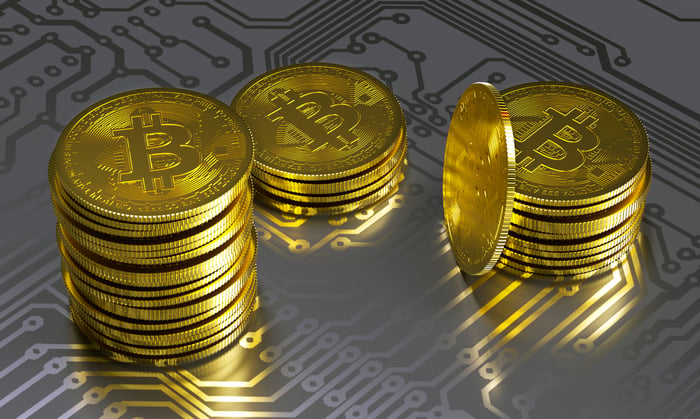When the chapter finally closes on 2017, it might go down as the greatest year on record for a single "asset" class. Cryptocurrencies have been on fire since the wave of the green flag on Jan. 1, and haven't slowed since.
After beginning the year with an aggregate market cap of $17.7 billion, the more than 1,360 virtual currencies were worth a combined $624 billion as of Dec. 19. That's a mind-boggling ascent of more than 3,400%, which compares to traditional equities like the stock market that returns an average of 7% a year, inclusive of dividend reinvestment and adjusted for inflation.

Image source: Getty Images.
Bitcoin has obviously been given a ton of credit for this rally in digital coins -- and rightfully so. It was the first tradable cryptocurrency, is accepted by more merchants than any other virtual coin, was granted legal-currency status in Japan earlier this year, and comprises nearly 49% of the aforementioned $624 billion crypto market cap.
But this is just as much about the nascent players this year. Excluding bitcoin, the aggregate market cap of all other cryptocurrencies has exploded from $2.24 billion on Dec. 31, 2016, to $321 billion on Dec. 19 -- an increase of more than 14,200%!
Blockchain gives cryptocurrencies a big boost in 2017
The catalysts behind this move in virtual currencies are too many to number, but most boil down to one key component: blockchain. Blockchain is the technology that underlies virtual currencies like bitcoin and is responsible for logging all transactions in a digital, distributed, and decentralized network, without the need for a third-party provider, which is often a bank.
There are a number of possible advantages to blockchain technology over current databases that financial service companies (and other industries for that matter) are really excited about. For example, the distributed and decentralized nature of blockchain ensures that there's no central data hub that cybercriminals can attack and cripple a virtual currency. Instead, data is spread on servers and hard drives around the globe, presumably protecting a cryptocurrency from a disastrous attack.

Image source: Getty Images,
Blockchain technology could also result in significantly smaller transaction fees for businesses and consumers. As noted, the current setup involves a bank or credit union acting as a third-party middleman when completing and settling transactions. Without this middleman involved, there are fewer mouths to feed with regard to transaction fees.
There's also the real possibility that transactions could be completed even quicker than they are now (especially cross-border transactions). Financial institutions are only open during "normal" business hours, while miners are busy proofing transactions and adding to the blockchain 24 hours a day, seven days a week. It may be possible for instantly settling transactions to become commonplace with blockchain.
This cryptocurrency CEO has a warning for investors in his company
This fascination with blockchain has carried over into the stock market as well. Virtually any stock of late that announces an association with blockchain development has been rewarded by big gains.
Perhaps the most well-known of these companies is online home-goods retailer Overstock.com (BYON 4.41%), which has jumped more than 200% this year. The rally in Overstock.com is primarily related to the development of the Medici t0 blockchain, which is a blockchain-based securities lending system that's designed to go toe to toe with Wall Street investmnt firms but for a cheaper operating cost.

Image source: Getty Images.
However, a new blockchain company has entered the picture in a big way. Financial technology company LongFin Corp. (LFIN), which only went public at $5 a share on Dec. 13, witnessed its share price rocket to as high as $142.82 (no, that's not a misprint) on Monday following a company announcement Friday that it had acquired Ziddu.com, a "blockchain-empowered solutions provider that offers microfinance lending against collateralized warehouse receipts in form of Ziddu coins." In a matter of days, LongFin's valuation moved from around $300 million to as much as $7 billion following word of this purchase.
But while shareholders were celebrating a lifetime's worth of gains over the span of just two days, Venkat Meenavalli, the chairman and CEO of LongFin, was sounding the warning bell in an interview with CNBC. After engaging in a debate with CNBC anchors over the legitimacy of his business, Meenavalli had this to say in response to questions regarding the company's billions of dollars in recently gained market cap: "It's not justified. It's insane. This market cap is not justified."
This is exactly what a bubble looks like
Following these comments, shares of LongFin plunged by more than 20% during premarket trading -- but they didn't stay there for long. In fact, shares of LongFin catapulted higher by 23% at one point during Tuesday's trading session.
And that's not all. It turns out that the company Ziddu.com was purchased from (Meridian Enterprises) is almost entirely owned by Meenavalli, according to LongFin spokesperson Hang Su, via Bloomberg.

Image source: Getty Images.
Said Meenavalli, "We are not going to make revenue from Ziddu.com this year, but it will account for 5-10 percent of revenue next year." Based on the $27.7 million in sales the company generated in the first nine months of fiscal 2016, per its prospectus filing with the Securities and Exchange Commission, and assuming a healthy growth rate, Ziddu.com's 5% to 10% contribution might amount to $3 million to $6 million, in my best estimate, in 2018.
So let's recap:
- LongFin bought an unproven blockchain commodity and saw its stock rise by more than 2,000% in two days.
- LongFin's CEO believes Ziddu.com will be a relatively small provider of sales in the coming year, and provide nothing toward fiscal 2017 sales.
- LongFin's CEO blatantly told CNBC anchors and the world that his company's valuation isn't justified.
- Shareholder shrugged off that commentary and pushed LongFin's stock even higher.
That's a bubble, folks. That's short-term day-traders, pure hype, and emotion driving this train and not one shred of fundamental logic to be found. "Caveat emptor" doesn't even do justice to how dangerous crypto stocks are becoming, and I would strongly suggest keeping your distance from LongFin and, frankly, any other stock devoting a majority of its business to blockchain development.

